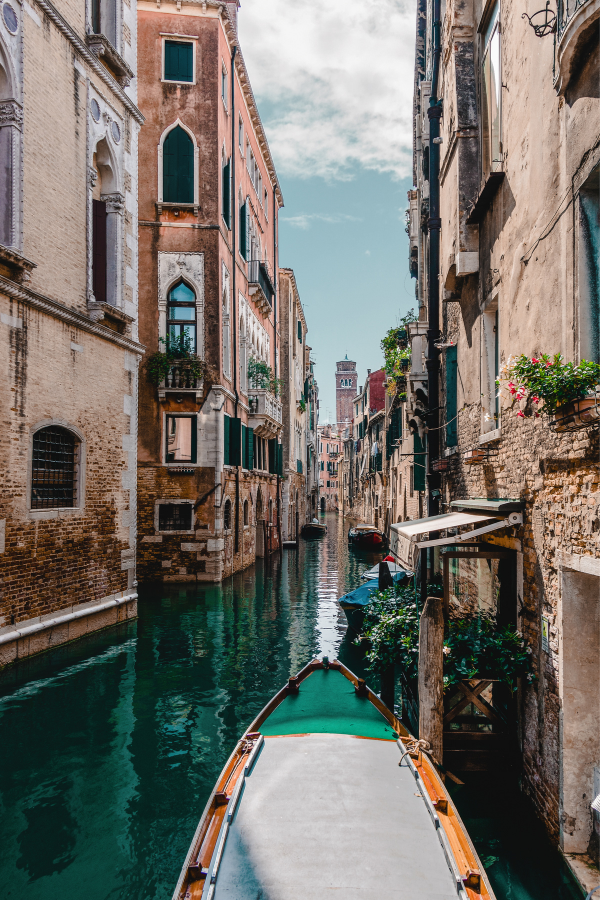

Taking Time Off: What is the Ideal Vacation Length?
Summary
Reflection Questions
Journal Prompt
As creative entrepreneurs, a vacation is that much-needed break we all take from the hustle of work and everyday chores, to chill out and recharge. It’s more than just a nice-to-have; it’s pretty key for keeping our sanity, dealing with chronic stress, and staying sharp when we’re back on the grind. When it comes to how long a vacation should be, well, opinions are all over the map. Some folks swear by quick getaways to get the batteries charged, while others are all for taking a long stretch to truly unwind. Research published in the Journal of Happiness Studies and referenced in this article by Travel + Leisure found that happiness levels peak just before the eighth day. But does that apply to everyone? In this article, we will dig into what makes for the perfect vacation length so you know what to do before scheduling your next trip.
Understanding Vacation Needs


When we talk about taking a vacation, we’re not just indulging in a leisurely pursuit; we’re actually investing in our psychological well-being. Research has shown that taking time off work can lead to improved mental health, with benefits like reduced stress, better mood, and even increased creativity upon returning to work. It’s like giving your brain a reset button, allowing it to recover from the relentless pace of daily tasks and responsibilities.
Individual Needs vs. One-Size-Fits-All Vacation Lengths
However, the ‘ideal’ length of a vacation isn’t a universal number that everyone can pencil into their calendars. It’s more personal than that. For some, a long weekend might be the perfect breather, while others might need a good couple of weeks to feel like they’ve truly gotten away. This variability isn’t just about personal preference; it’s also about what each person’s life and work demand of them. One person’s quick recharge is another person’s drop in the ocean. It’s about finding what works for you.
Work-Life Integration


And then there’s the question of work-life integration, a concept that’s been getting a lot of buzz for good reason. It’s all about finding that sweet spot between professional responsibilities and the rest of your life. Your ideal vacation time is tied to this balancing act. If you’re constantly connected to your work, a longer break with more free time might be necessary to truly unplug.
On the other hand, if you’ve mastered the art of leaving work at the office, shorter, more frequent vacations could be just the ticket. The goal is to ensure that your time off helps you maintain a healthy equilibrium, rather than being a mere escape from a work-dominated existence.
Factors Influencing Vacation Length


When you’re zeroing in on how long to take off for a vacation, you can’t ignore the realities of work constraints. First off, there’s the straightforward issue of paid time off (PTO) policies. These policies can vary wildly from one workplace to another, and they often set the upper limit for vacation time.
Sure, you might be dreaming of a month in Bali, but if your job only dishes out two weeks of PTO a year, that’s your cap right there unless you’re willing to take unpaid leave. Of course, this all changes when you are a creative entrepreneur in charge of doling out vacation time to employees—and herself!
Workplace Culture and Vacation Stigma
Then there’s the subtler, but no less real, issue of workplace culture and the stigma that can come with taking a vacation. In some offices, there’s an unspoken rule that taking your full allotment of vacation days is frowned upon, a sign that you’re not fully committed. This kind of environment can seriously cramp your vacation style, making you second-guess whether to take that extra week, even if you’re technically entitled to it.
Personal Obligations


Switching gears to personal obligations, your family commitments can play a big part in your vacation calculus. Maybe you’ve got kids in school with non-negotiable schedules, or you’re caring for an elderly relative. And it’s not just about the people in your life—personal projects and responsibilities can also anchor you to shorter getaways. Renovating the kitchen or taking a professional development course? These commitments can dictate taking multiple short breaks rather than one long haul.
Financial Considerations
Now let’s talk money—because let’s face it, finances often have the final say. Budget constraints are a practical limit on vacation length. Even if you’ve accrued paid vacation time and gotten the green light from the boss (which might be you!), if the wallet says no, that’s pretty much the end of the story. And when you’re weighing the cost-benefit of longer versus shorter vacations, remember it’s not just the upfront costs. Longer trips can mean you’re dipping into savings or missing out on income you’d otherwise be making.
Fuel your creative fire & be a part of a supportive community that values how you love to live.
subscribe to our newsletter
Travel Goals
Your travel goals can also steer the vacation duration discussion. Looking for relaxation or adventure or inspiration for upcoming projects? A few days at a nearby beach could suffice for a restful break, while an epic adventure usually calls for a long vacation. And if you’re traveling far, you’ve got to consider jet lag and travel time. A weekend trip to a far-flung locale could leave you more worn out than when you started.
Psychological and Physical Health
Finally, your physical and psychological health are perhaps the most personal factors of all. Some of us can bounce back from stress with just a day trip or a weekend of downtime, while others need a more extended period of three weeks or more to find their feet again. One person might need more frequent trips to multiple destinations, while others take longer vacations just once a year.
It’s important to listen to your body and mind. If you’re constantly operating in high-stress mode, a longer vacation might do wonders for your health. It’s not indulgent; it’s necessary. The need for rest and recuperation isn’t just about feeling good—it’s about keeping you functioning at your best.
The Debate: Short vs. Long Vacations


The debate between the merits of short versus long vacations is ongoing and nuanced, with compelling arguments on both sides. Of course, studies have shown that eight days is the perfect amount of time, but does that really apply to everyone? We all have different personalities, lifestyles, desires, and restrictions. Let’s take a closer look at the pros and cons of short vs. long vacations.
Advantages of Short Vacations
Short vacations allow for more frequent interruptions of the monotony of daily life, providing regular bursts of rest and recreation throughout the year. Whether weekend trips or day trips, these short jaunts are often less expensive and more achievable than taking off several weeks at a time.
This frequency can also lead to a greater variety of experiences, as shorter trips provide opportunities to explore new destinations or enjoy quick, repeated escapes to beloved locales. Financially, short vacations tend to exert less strain on the wallet, allowing for budget-friendly adventures that don’t necessitate extensive savings or financial gymnastics.
For those with demanding careers or family lives, these brief respites can be a more realistic option, meshing more conveniently with the relentless pace of a busy schedule.
Advantages of Long Vacations


On the flip side, long vacations come with their own set of advantages. They offer a profound depth of relaxation and disconnection that shorter trips often can’t match. With more time to unwind, the stress of work and daily routines can thoroughly dissipate, allowing for a more complete mental and emotional reset.
Extended time off also opens up the possibility of more comprehensive travel experiences. Longer vacations mean you can take the scenic route, immerse yourself in new cultures, and explore destinations more fully, without the pressure to rush back.
Perhaps most significantly, the ample time afforded by a long vacation can pave the way for introspection and life recalibrations. Away from the distractions of their regular environments, individuals can reflect on their lives, often returning with fresh perspectives and even the impetus for meaningful change.
In weighing the benefits of short against long vacations, one finds that the decision is deeply personal and contingent on individual circumstances and values. The optimal vacation length is less about a prescribed number of days and more about what those days can do for one’s well-being and life satisfaction.
Finding Your Optimal Vacation Length


Finding the ideal vacation length is a personal journey that requires introspection and a candid assessment of both personal and professional circumstances. It’s about understanding your own rhythm of life and work. Professionally, one must consider how much time can be taken without jeopardizing work responsibilities or burdening colleagues.
This evaluation often goes hand-in-hand with reflecting on one’s role in the workplace and the feasibility of disconnecting for a set period. Personally, it involves considering family obligations, social commitments, and your own need for rest. It’s a balancing act, weighing the demands of your personal life against the opportunity to take a break from them.
Delving deeper and identifying personal preferences and priorities is crucial. This step goes beyond merely asking, “What do I want from a vacation?” It’s about aligning your time off with your values and what brings you joy and contentment. Are you someone who values frequent, spontaneous trips as a way to recharge, or do you crave the immersive experience that only comes with an extended stay? Your vacation should reflect what you prioritize: adventure, relaxation, culture, or maybe a blend of everything.
Adjusting expectations based on past vacation experiences can also guide you toward your ideal vacation length. Reflect on your previous breaks and ask yourself some pointed questions. Did a past week-long vacation leave you feeling rejuvenated or just as stressed when you returned? Did the long vacation you took feel too disconnected from your professional life, or did it hit the sweet spot of relaxation and disconnection? These reflections can help tailor future vacation plans, using your own history as a bespoke guide.
Ultimately, the sweet spot for your optimal vacation length is where your personal and professional lives can afford the time away, your preferences and priorities are honored, and your past experiences inform your future choices. It’s about crafting the time to not only step away from the everyday but to return to it with a renewed sense of vigor and clarity.
What is Your Ideal Vacation Length?


Whether visiting family or soaking up the local culture, what you deem enough time will differ from the ideal length of another person’s vacation. Do you prefer a day trip, a weekend trip, one-week getaway, or a month on vacation? How long does it take to truly immerse yourself in a new city and reap the positive effects of your trip? Let us know in the comments below!








